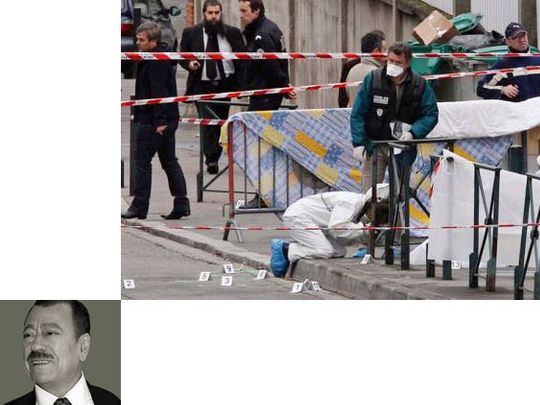
The month of March has been steeped in the blood of innocent children. In Gaza, three children were among 26 Palestinians killed in Israeli air strikes on their homes — and 27 more were seriously wounded. These killings, according to the western press, were ‘in retaliation’ for rocket attacks on Israel. These little un-named splashes of humanity were quietly buried by the media and their grieving families in the barren dust of Gaza.
In Afghanistan, nine sleeping children were among 16 villagers shot dead by a member (or members, this remains disputed) of the US occupation forces. This time the killer, according to the western press, was a ‘rogue soldier’ — a description that has the curious effect of diminishing intentionality. US Staff Sergeant Robert Bales was smart enough to burn the bodies, though. Spirited away to face ‘justice’ in the US, his lawyer boasts that he will clear his client: “They have no murder scene, no forensics…I’m going to make them prove every claim.”
In Toulouse, three small Jewish children were murdered by lone wolf Al Qaida terrorist, Mohammad Merah, as they made their way to school. The world was, rightly, shocked and outraged — but more so. This killer was the only one routinely described as ‘cold-blooded’. The children’s names and ages were meticulously detailed in every news report which also carried their portraits — unlike the Muslim victims of the other crimes who remained anonymous in most reports.
The Jewish victims’ bodies were shipped to Israel where they were given a state funeral in occupied Jerusalem, attended by thousands. Israeli Prime Minister Benjamin Netanyahu did not shrink from making political capital out of the tragedy, “For these murderers, wherever a Jew walks is occupied territory… They want to murder Jews wherever they are, and for that reason the state of Israel was established”. Who are ‘these murderers’? One can only assume he means Muslims.
Why have these three tragic stories attracted such different coverage; why are they met with such contrasting emotions by a significant section of the general public in the west? The answer was made manifest in another incident in Iraq which took place in 2006 in the village of Mahmoudiya.
It was March then, too, when US soldier, Steven Green and four colleagues broke into the humble village home of the Al Janabi family. In front of her terrified six-year old sister and parents, a slightly-built 14-year-old girl, Abeer, was held down and raped by two of Green’s companions. Green took his turn and then shot the girl several times in the face — an experience he described as ‘awesome’ — before executing the rest of her family.
In 2011, Green appealed his life sentence for these crimes in the American courts. His defence? “I wasn’t thinking that these people were humans.”
Dehumanisation is behind all these killings. Merah clearly erased his victims’ humanity from his psychological register or he would not have been able to shoot small children dead at point-blank range. Dehumanisation allowed the Nazis to carry out their terrible crimes against the Jews, the disabled, the gay community and the gypsies, and enabled the German population to acquiesce.
Dehumanisation of Muslims, however, is currently happening on an industrial scale. Who can forget the sight of US soldiers urinating on the corpses of three Afghans? The notion that the world’s 1.5 billion Muslims are inferior and that even their children are somehow not deserving of normal, humane, moral consideration, begins with Israel and is widely disseminated by western politicians and media.
On March 19, the head of European Union Foreign Policy, Catherine Ashton made the slightest allusion to a comparability between the Toulouse murders and children killed in Gaza: “When we think about what happened in Toulouse,” she said, “We remember what happened in Norway last year… and we see what is happening in Gaza and other places — we remember young people and children who lose their lives.”
This implied equivalence provoked a furious response from the Israeli government; Ashton’s comments were described as ‘anti-semitic’ and ‘inappropriate’. Readers’ feedback columns in Israeli newspapers seethed with vitriol and personal abuse aimed at Ashton.
Israel cannot handle even the mildest criticism and is currently threatening to cut all ties with the UN Human Rights Council because it has initiated a fact-finding mission into the ‘effects of [illegal Israeli] colonies on Palestinian human rights’. Last year Netanyahu called for the UN’s Goldstone report — which found that Israel used banned white phosphorous in its 2009 onslaught on Gaza in which 400 children were killed — be ‘tossed into the trash can of history’.
Meanwhile, Merah’s claim that he was a member of Al Qaida — an organisation predicated on resistance to America’s invasion of Muslim lands and its unconditional support for Israel — is a serious development.
Al Qaida is resurgent in the Maghreb, on the other side of the Mediterranean. The group benefited greatly from the Arab Spring uprising in Libya and procured sophisticated weaponry from Muammar Gadaffi’s abandoned stockpiles.
So-called ‘lone wolf attacks’ are being actively encouraged by the Al Qaida leadership and I fear that more are likely on western soil. Men like Merah — embittered, disenfranchised and unstable — are easily recruited; and their deadly hatred nurtured, not only by atrocities against Muslims like those outlined above, but the dismissive indifference with which the international community is perceived to respond.
We must, as humans, weep for all our dead children, whether Muslim, Christian or Jew. But let us weep for them equally.
Abdel Bari Atwan is editor of the pan-Arab newspaper Al Quds Al Arabi.










